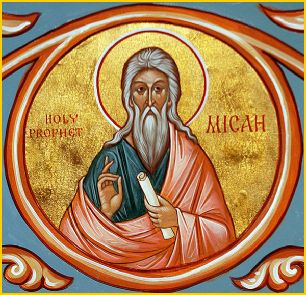|
|||
|---|---|---|---|
| This weekly bulletin insert complements the curriculum published by the Department of Christian Education of the Orthodox Church in America. This and many other Christian Education resources are available at http://dce.oca.org. | |||

The prophet Micah was a younger contemporary of Isaiah but came from a very different background. While Isaiah was an aristocrat, Micah was a working-class man, and it shows in his writing. He came from a small village in the foothills between the coastal plain and the central highlands of Palestine. He was keenly aware of the struggles of the working poor, and harshly critical of the greedy rich who exploited and oppressed them. Micah couched his prophetic warnings to corrupt public officials in earthy, graphic language: "Hear, you heads of Jacob and rulers of the house of Israel! You who hate the good and love the evil, who tear the skin from off my people, and their flesh from off their bones; who eat the flesh of my people and flay their skin from off them, and break their bones in pieces, and chop them up like meat in a kettle, like flesh in a cauldron" (2:1-4). It wasn't only Micah's background that distinguished him from Isaiah. He also didn't share the older prophet's firm conviction that Jerusalem, being the holy city of Zion, would never be destroyed. Micah saw the city as a den of corruption rather than a place inviolably protected by God. He wrote: "Therefore because of you Zion shall be plowed as a field; Jerusalem shall become a heap of ruins..." (3:12). A century later, the prophet Jeremiah made similar predictions concerning Jerusalem, so infuriating religious leaders that they wanted to put him to death for treason. But others saved Jeremiah's life by reminding everyone of Micah's earlier prophecy, which like Jeremiah's was clearly spoken in the name of the Lord. For all his scathing rebukes, Micah also gives us beautiful words of peace and hope. In 4:3 we read, "...and they shall beat their swords into plowshares, and their spears into pruning hooks; nation shall not lift up sword against nation, neither shall they learn war any more." It is Micah who prophesies that "You, O Bethlehem Ephrathah, who are little to be among the clans of Judah, from you shall come forth for Me one who is to be ruler in Israel, whose origin is from of old, from ancient days" (5:1). He also reminds us "to do justice, and to love kindness, and to walk humbly with your God" (6:8). II Corinthians 1: 20-21 tells us that Jesus Christ never vacillates, never says both Yes and No. In Him it is "always Yes. For all the promises of God find their Yes in Him." That faithful "Yes" in God is anticipated in Micah when he says, "I will wait for the God of my salvation" (7:7) and especially in his prophecy's final words: "Thou wilt cast all our sins into the depths of the sea. Thou wilt show faithfulness to Jacob, and steadfast love to Abraham, as Thou hast sworn to our fathers from the days of old" (7:19-20). |
|||
